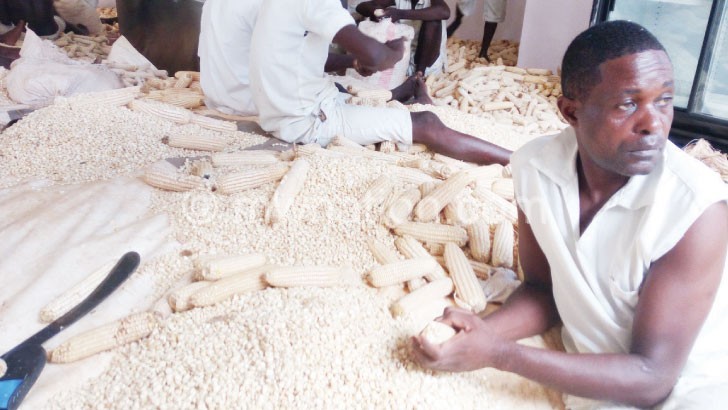Cracking prisons food puzzle
The country’s prisons have the capacity to feed themselves, but the road to self-sufficiency appears long, constricted and elusive.
For years, the institution, which has vast fields and thousands of free labour in convicts sentenced to hard labour, has been struggling to meet its food requirements.
Officials are worried that the majority of the prisons no longer harvest enough to feed the inmates for half a year.
The food situation was already in question as early as 2007 when commissioner of prisons Tobias Nowa, who was in-charge of operations and public relations, paradoxically claimed that the correctional facilities were able to feed themselves once again and would continue on that path for years.
The publicist envisaged the prisons selling the surplus to supplement its unmet budget, saying: “If we grow more crops we should be able to raise money to buy uniforms and other items.”
However, the hopes for surplus have been dashed.

Fast forward to 2016, the opposite is true.
Farm managers of Mpyupyu, Domasi, Mwanza prisons—traditionally the food baskets of Malawi Prisons Service (MPS)—are concerned with dwindling harvests.
“For the past two growing season, we have failed to feed ourselves. We used to harvest over 3 000 bags of maize weighing 50 kilogrammes (kg) each, but in 2015 and 2016, we yielded just 800 bags,” says Mpyupyu’s Layman Mthyoka.
The prison, located in the rich alluvial soils of Lake Chilwa wetland in Zomba, houses 289 long-serving inmates that are about to walk free. The inmates do not get ready-food, but they receive 680 grammes (0.68kg) of maize flour every day to cook for themselves.
The facility’s food requirement is about 197kg a day and 71.8 tonnes per year—almost 1 435 bags.
A study by Stein Holden, a researcher from Norwegian University of Life Sciences, shows that hybrid maize can produce an average of 1 773kgs per hectare and local varieties 1450kg if artificial fertilisers are applied.
Mpyupyu, formerly an agricultural training school, sits on 272 hectares, with the likelihood of tripling the prison’s expected yield to no less than 482.2 tonnes or 9 600 bags.
Given its annual food demand, Mpyupyu could sell about 7 000 bags as envisioned by Nowa almost 10 years ago.
That the prison service spends millions on food is another story of Malawians wallowing in hunger and poverty in the middle of plenty.
It points to underutilisation of the abundant labour and land at its disposal.
The country’s overcrowded prisons, which play home to almost 14 000 inmates, use just a small area of the over 7 000 hectares at their disposal.
The prison service, which requires 9.5 tonnes daily, would be churning out almost 6 000 tonnes of maize if it put half of its land to good use.
Assistant Commissioner of Prisons Brighton Simwela, who manages the farms, confirms that both the land and labour force at hand are underutilised.
According to him, the prisons cultivated only 145 hectares this year-downsizing from about 220 the previous year.
“Out of the 145 hectares, 45 comprised pigeon peas, 10 for cassavas, 17 hectares for soya and 15 hectares for sorghum. We have maize on 58ha,” explains Simwela.
However, the prison farms are not exempted from droughts, storms and other harsh effects of climate change.
The changing weather pattern, especially unreliable rains, are blamed for falling yields from the farms that Simwela described as “becoming barren and too hard for farming”.
“Our main challenge is climate change. The rains have been erratic and we do not have facilities to do modern irrigation. We are appealing to well wishers to support our irrigating farming,” he says.
The prisons need farm machinery and sustainable agricultural methods to boost its yield amid unpredictable climatic conditions.
Currently, most of the prisons are using gravity-fed irrigation systems.
According to Simwela farming has become expensive for the prisons’ annual budget line.
This year, MPS drew a budget totalling K350 million.
However, Treasury trimmed the figures and Parliament approved only K99 million.
Simwela sounds nostalgic.
He says: “Once upon a time, we were able to feed our prisoners and to donate excess grain to other public institutions. Something just went wrong, but I am sure we can repeat this success.”
The prisons need to think strategically to maximise its yield and surmount overdependence on rain-fed agriculture.
Adopting modern farming methods and irrigation technologies, maximising land use and use of recommended farm inputs materials is not optional, he says.
Nowa’s successor Masauko Wiscot shares the dream of food security and surplus.
“Putting the land and labour force to good use will not only make the prisons self-sufficient, but also boost the inimates’ chances of leaving the cells reformed and equipped with various skills and modern farming methods.” n





